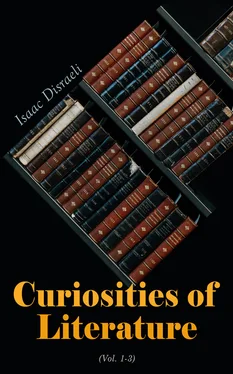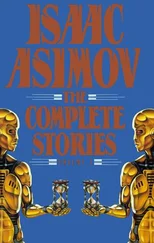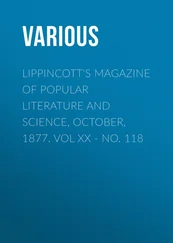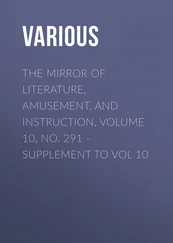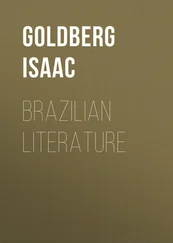Isaac Disraeli - Curiosities of Literature (Vol. 1-3)
Здесь есть возможность читать онлайн «Isaac Disraeli - Curiosities of Literature (Vol. 1-3)» — ознакомительный отрывок электронной книги совершенно бесплатно, а после прочтения отрывка купить полную версию. В некоторых случаях можно слушать аудио, скачать через торрент в формате fb2 и присутствует краткое содержание. Жанр: unrecognised, на английском языке. Описание произведения, (предисловие) а так же отзывы посетителей доступны на портале библиотеки ЛибКат.
- Название:Curiosities of Literature (Vol. 1-3)
- Автор:
- Жанр:
- Год:неизвестен
- ISBN:нет данных
- Рейтинг книги:3 / 5. Голосов: 1
-
Избранное:Добавить в избранное
- Отзывы:
-
Ваша оценка:
- 60
- 1
- 2
- 3
- 4
- 5
Curiosities of Literature (Vol. 1-3): краткое содержание, описание и аннотация
Предлагаем к чтению аннотацию, описание, краткое содержание или предисловие (зависит от того, что написал сам автор книги «Curiosities of Literature (Vol. 1-3)»). Если вы не нашли необходимую информацию о книге — напишите в комментариях, мы постараемся отыскать её.
Curiosities of Literature (Vol. 1-3) — читать онлайн ознакомительный отрывок
Ниже представлен текст книги, разбитый по страницам. Система сохранения места последней прочитанной страницы, позволяет с удобством читать онлайн бесплатно книгу «Curiosities of Literature (Vol. 1-3)», без необходимости каждый раз заново искать на чём Вы остановились. Поставьте закладку, и сможете в любой момент перейти на страницу, на которой закончили чтение.
Интервал:
Закладка:
I have ventured to enter into some details as to the earlier and obscurer years of my father's life, because I thought that they threw light upon human character, and that without them, indeed, a just appreciation of his career could hardly be formed. I am mistaken, if we do not recognise in his instance two very interesting qualities of life: predisposition and self-formation. There was a third, which I think is to be honoured, and that was his sympathy with his order. No one has written so much about authors, and so well. Indeed, before his time, the Literary Character had never been fairly placed before the world. He comprehended its idiosyncrasy: all its strength and all its weakness. He could soften, because he could explain, its infirmities; in the analysis and record of its power, he vindicated the right position of authors in the social scale. They stand between the governors and the governed, he impresses on us in the closing pages of his greatest work.4 Though he shared none of the calamities, and scarcely any of the controversies, of literature, no one has sympathised so intimately with the sorrows, or so zealously and impartially registered the instructive disputes, of literary men. He loved to celebrate the exploits of great writers, and to show that, in these ages, the pen is a weapon as puissant as the sword. He was also the first writer who vindicated the position of the great artist in the history of genius. His pages are studded with pregnant instances and graceful details, borrowed from the life of Art and its votaries, and which his intimate and curious acquaintance with Italian letters readily and happily supplied. Above all writers, he has maintained the greatness of intellect, and the immortality of thought.
He was himself a complete literary character, a man who really passed his life in his library. Even marriage produced no change in these habits; he rose to enter the chamber where he lived alone with his books, and at night his lamp was ever lit within the same walls. Nothing, indeed, was more remarkable than the isolation of this prolonged existence; and it could only be accounted for by the united influence of three causes: his birth, which brought him no relations or family acquaintance; the bent of his disposition; and the circumstance of his inheriting an independent fortune, which rendered unnecessary those exertions that would have broken up his self-reliance. He disliked business, and he never required relaxation; he was absorbed in his pursuits. In London his only amusement was to ramble among booksellers; if he entered a club, it was only to go into the library. In the country, he scarcely ever left his room but to saunter in abstraction upon a terrace; muse over a chapter, or coin a sentence. He had not a single passion or prejudice: all his convictions were the result of his own studies, and were often opposed to the impressions which he had early imbibed. He not only never entered into the politics of the day, but he could never understand them. He never was connected with any particular body or set of men; comrades of school or college, or confederates in that public life which, in England, is, perhaps, the only foundation of real friendship. In the consideration of a question, his mind was quite undisturbed by traditionary preconceptions; and it was this exemption from passion and prejudice which, although his intelligence was naturally somewhat too ingenious and fanciful for the conduct of close argument, enabled him, in investigation, often to show many of the highest attributes of the judicial mind, and particularly to sum up evidence with singular happiness and ability.
Although in private life he was of a timid nature, his moral courage as a writer was unimpeachable. Most certainly, throughout his long career, he never wrote a sentence which he did not believe was true. He will generally be found to be the advocate of the discomfited and the oppressed. So his conclusions are often opposed to popular impressions. This was from no love of paradox, to which he was quite superior; but because in the conduct of his researches, he too often found that the unfortunate are calumniated. His vindication of King James the First, he has himself described as "an affair of literary conscience:" his greater work on the Life and Times of the son of the first Stuart arose from the same impulse. He had deeply studied our history during the first moiety of the seventeenth century; he looked upon it as a famous age; he was familiar with the works of its great writers, and there was scarcely one of its almost innumerable pamphlets with which he was not acquainted. During the thoughtful investigations of many years, he had arrived at results which were not adapted to please the passing multitude, but which, because he held them to be authentic, he was uneasy lest he should die without recording. Yet strong as were his convictions, although, notwithstanding his education in the revolutionary philosophy of the eighteenth century, his nature and his studies had made him a votary of loyalty and reverence, his pen was always prompt to do justice to those who might be looked upon as the adversaries of his own cause: and this was because his cause was really truth. If he has upheld Laud under unjust aspersions, the last labour of his literary life was to vindicate the character of Hugh Peters. If, from the recollection of the sufferings of his race, and from profound reflection on the principles of the Institution, he was hostile to the Papacy, no writer in our literature has done more complete justice to the conduct of the English Romanists. Who can read his history of Chidiock Titchbourne unmoved? or can refuse to sympathise with his account of the painful difficulties of the English Monarchs with their loyal subjects of the old faith? If in aPg xxxiii parliamentary country he has dared to criticise the conduct of Parliaments, it was only because an impartial judgment had taught him, as he himself expresses it, that "Parliaments have their passions as well as individuals."
He was five years in the composition of his work on the "Life and Reign of Charles the First," and the five volumes appeared at intervals between 1828 and 1831. It was feared by his publisher, that the distracted epoch at which this work was issued, and the tendency of the times, apparently so adverse to his own views, might prove very injurious to its reception. But the effect of these circumstances was the reverse. The minds of men were inclined to the grave and national considerations that were involved in these investigations. The principles of political institutions, the rival claims of the two Houses of Parliament, the authority of the Established Church, the demands of religious sects, were, after a long lapse of years, anew the theme of public discussion. Men were attracted to a writer who traced the origin of the anti-monarchical principle in modern Europe; treated of the arts of insurgency; gave them, at the same time, a critical history of the Puritans, and a treatise on the genius of the Papacy; scrutinised the conduct of triumphant patriots, and vindicated a decapitated monarch. The success of this work was eminent; and its author appeared for the first and only time of his life in public, when amidst the cheers of under-graduates, and the applause of graver men, the solitary student received an honorary degree from the University of Oxford, a fitting homage, in the language of the great University, "OPTIMI REGIS OPTIMO VINDICI."
I cannot but recall a trait that happened on this occasion. After my father returned to his hotel from the theatre, a stranger requested an interview with him. A Swiss gentleman, travelling in England at the time, who had witnessed the scene just closed, begged to express the reason why he presumed thus personally and cordially to congratulate the new Doctor of Civil Law. He was the son of my grandfather's chief clerk, and remembered his parent's employer; whom he regretted did not survive to be aware of this honourable day. Thus, amid all the strange vicissitudes of life, we are ever, as it were, moving in a circle.
Читать дальшеИнтервал:
Закладка:
Похожие книги на «Curiosities of Literature (Vol. 1-3)»
Представляем Вашему вниманию похожие книги на «Curiosities of Literature (Vol. 1-3)» списком для выбора. Мы отобрали схожую по названию и смыслу литературу в надежде предоставить читателям больше вариантов отыскать новые, интересные, ещё непрочитанные произведения.
Обсуждение, отзывы о книге «Curiosities of Literature (Vol. 1-3)» и просто собственные мнения читателей. Оставьте ваши комментарии, напишите, что Вы думаете о произведении, его смысле или главных героях. Укажите что конкретно понравилось, а что нет, и почему Вы так считаете.
